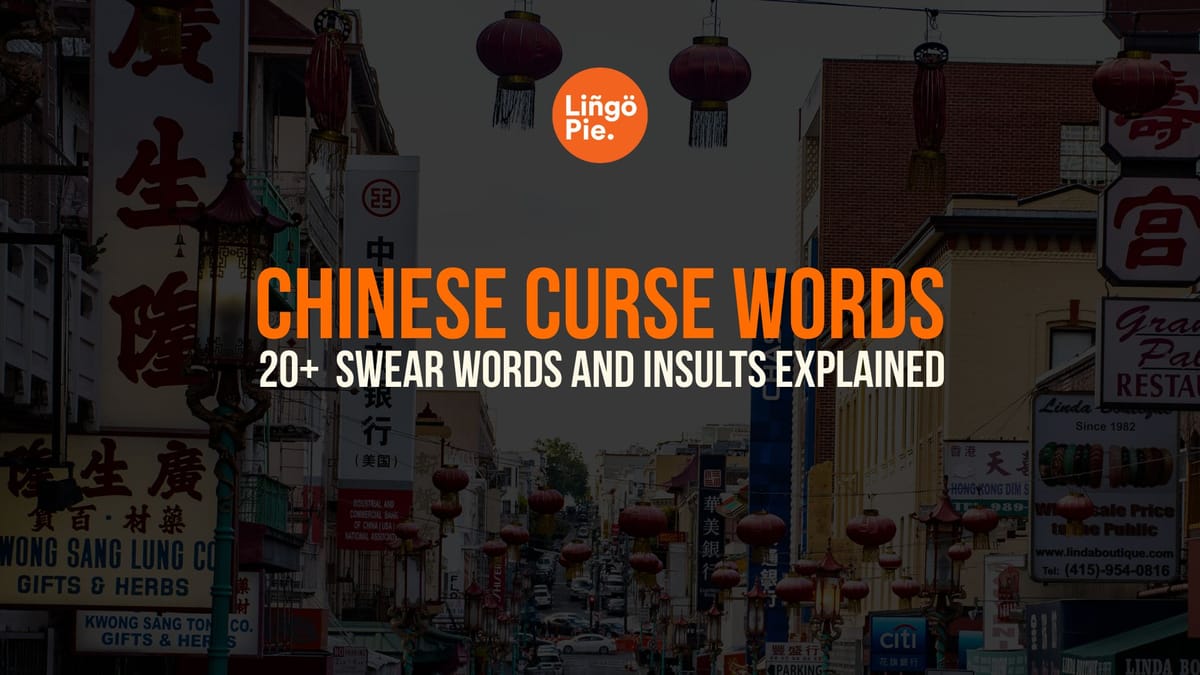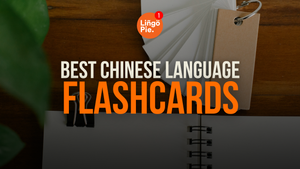Look, when you're learning Chinese, you're gonna run into curse words eventually. Maybe you’re watching a C-drama and someone gets angry, or you overhear a heated conversation on the street. These Chinese swear words are everywhere in real conversations, and pretending they don’t exist won’t help you understand what people are saying.
Chinese curse words and insults tell you a lot about the culture too. Some reference historical figures or classical literature, while others are modern slang. I'm not saying you should use them, but learning these bad words in Chinese with English translation helps you follow along when conversations in real life or films get heated.
In this post, I'll share with you 20+ Chinese insults and curse words that you’ll actually hear people use, plus what they mean and when you might encounter them.
- 6 Best Chinese Dramas On Netflix Every Fan Should See
- Best Way To Learn Chinese: Tips & Techniques For Learning Mandarin
- 7 Romantic Chinese Shows You Need To Watch With Your Partner

How To Swear In Chinese?
Chinese swear words primarily involve family references and sexual terminology, with milder insults often comparing people to animals or eggs. The most common Chinese curse word is 他妈的 (tā mā de), literally meaning "his mother’s," which functions like "damn it" or "shit" in English and is heard daily in big cities.
Stronger Chinese bad words include 傻屄 (shǎ bī), meaning "stupid cunt," commonly shouted at football matches, while the ultimate curse is 肏你祖宗十八代, meaning "fuck your ancestors back to the eighteenth generation”.
Unlike Americans who pair swearing with the middle finger, Chinese people generally avoid hand gestures while cursing. The middle finger exists in China but is considered highly offensive. Instead, Chinese people are more likely to shake their heads when frustrated.
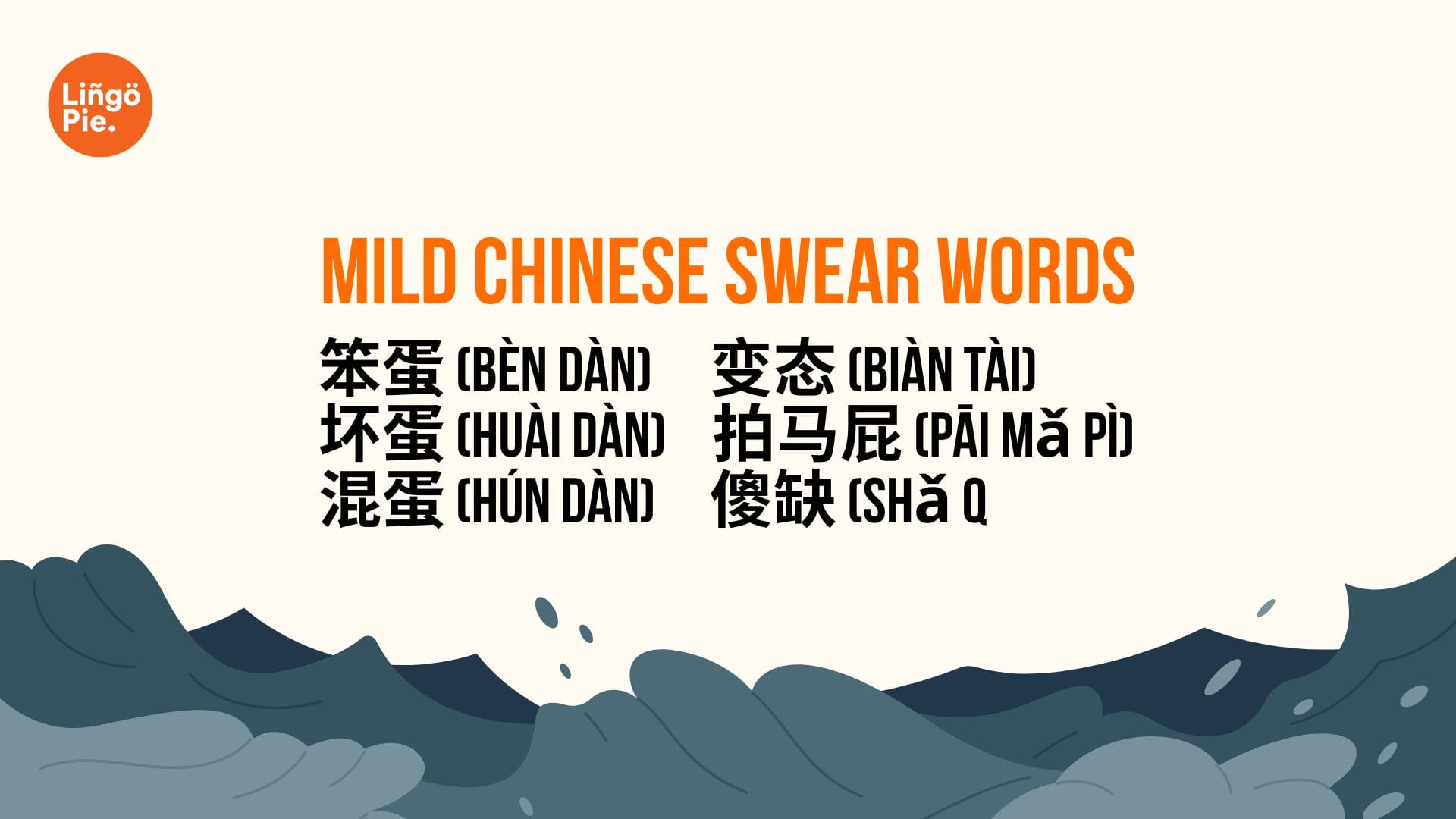
Mild Chinese Swear Words
These Chinese bad words are safe to use around friends and won't get you into serious trouble. Most involve calling someone an "egg" or comparing them to animals, which sounds silly in English but works as genuine insults in Chinese.
笨蛋 (bèn dàn)
This literally means "stupid egg" and is used to call someone a fool, idiot, or moron. The egg reference in Chinese insults stems from cultural associations where eggs represent something fragile, empty, or worthless. It's mild enough that parents might use it to scold children, making it one of the safest Chinese insults to learn first.
坏蛋 (huài dàn)
Translating to "bad egg," this term describes someone unscrupulous or morally questionable. Unlike Western culture where "bad egg" sounds quaint, in Chinese this carries genuine disapproval. You'll often hear this Chinese swear word used for people who lie, cheat, or behave badly, though it's still considered a relatively gentle way to express criticism.
混蛋 (hún dàn)
Meaning "mixed egg," this insult questions someone's parentage or origins, similar to calling someone a bastard in English. The "mixed" aspect implies uncertain or illegitimate lineage, which carries quite a weight in family-focused Chinese culture. It's stronger than the previous eggs but still within acceptable casual usage.
变态 (biàn tài)
This word means "pervert" or "abnormal" and targets someone's behavior or mental state. Interestingly, you'll also hear this word in restaurants to describe extremely spicy food ("pervertedly hot"), showing how context completely changes meaning in Chinese. When used as an insult, it suggests someone acts strangely or inappropriately.
拍马屁 (pāi mǎ pì)
Literally "patting a horse's backside," this phrase describes brown-nosing or sucking up to someone. The imagery comes from the idea that only a fool would pat a horse's rear end and risk getting kicked. It's commonly used in workplace contexts to describe colleagues who flatter their bosses excessively.
傻缺 (shǎ quē)
This simply means "fool" or "dummy" and is among the mildest insults in Chinese. It's often used playfully between friends, similar to how English speakers might call someone a "silly goose." The character 缺 means "lacking," so you're essentially calling someone lacking in intelligence, but without serious malice.
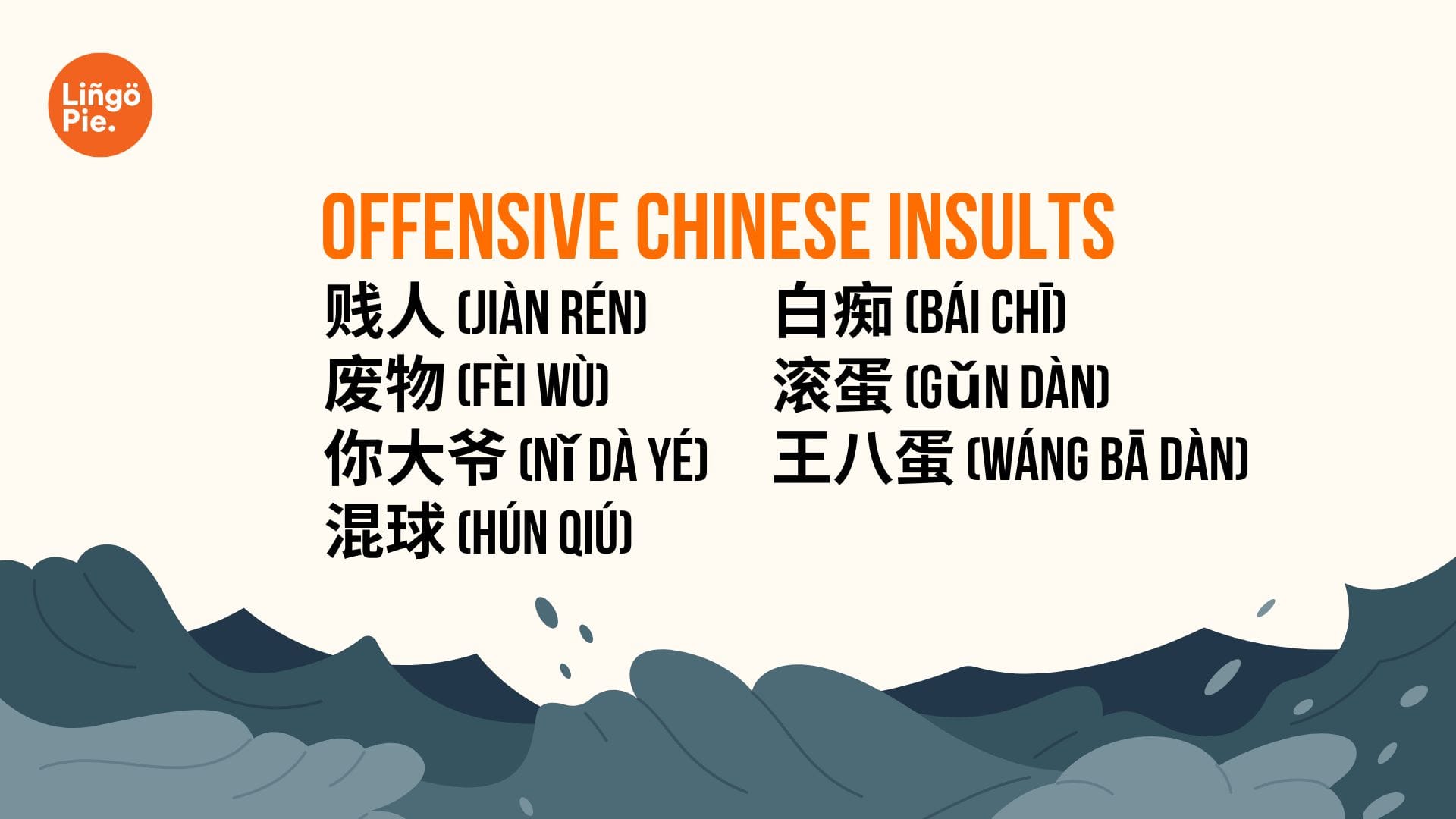
Offensive Chinese Insults
These Chinese curse words pack more punch and can genuinely upset people. They often target someone's intelligence, character, or sexual behavior, making them unsuitable for casual use.
Save these Chinese bad words for when you're truly angry, but be prepared for strong reactions since they cross into genuinely insulting territory.
王八蛋 (wáng bā dàn)
Literally "turtle egg" or "tortoise egg," this is equivalent to calling someone a "son of a bitch" in English. The cultural context stems from the belief that female turtles mate with snakes when male turtles aren't available, implying the person's mother was unfaithful. This insult questions both parentage and family honor, making it significantly more offensive than mild egg-based insults.
贱人 (jiàn rén)
This translates to "cheap person" or "bitch" and is particularly offensive when directed at women. The character 贱 means "lowly" or "base," suggesting the person lacks moral worth or dignity. Use this with extreme caution, especially around Chinese women, as it can provoke strong reactions and is considered deeply disrespectful.
废物 (fèi wù)
Meaning "waste" or "garbage," this insult calls someone completely useless and worthless. Unlike playful insults about intelligence, this attacks someone's entire value as a person. It's commonly used to describe someone who contributes nothing to society or consistently fails at everything they attempt.
混球 (hún qiú)
This translates to "scoundrel" or "douchebag" and targets someone's character rather than intelligence. The word implies the person is morally corrupt, dishonest, or generally untrustworthy. It's often used for people who cheat, lie, or take advantage of others, making it a serious character assassination.
白痴 (bái chī)
Literally meaning "idiot" or "moron," this is much harsher than mild intelligence-based insults. It suggests the person has serious mental deficiencies and is fundamentally stupid rather than just making poor decisions. The term carries medical connotations of mental disability, making it particularly cruel.
滚蛋 (gǔn dàn)
Translating to "rolling egg," this means "fuck off" or "get lost" but with more aggression than polite dismissals. The imagery suggests the person should roll away like an egg, combining dismissal with the insulting egg metaphor. It's much ruder than simply asking someone to leave and signals genuine anger or frustration.
你大爷 (nǐ dà yé)
One common insult in Chinese is “你大爷” (n dà yé), which literally means ‘your big uncle’. This term, like other curse words, can be considered offensive and disrespectful towards one’s elders when used seriously. Its severity depends on the context and may not carry as much weight when said playfully or among friends.
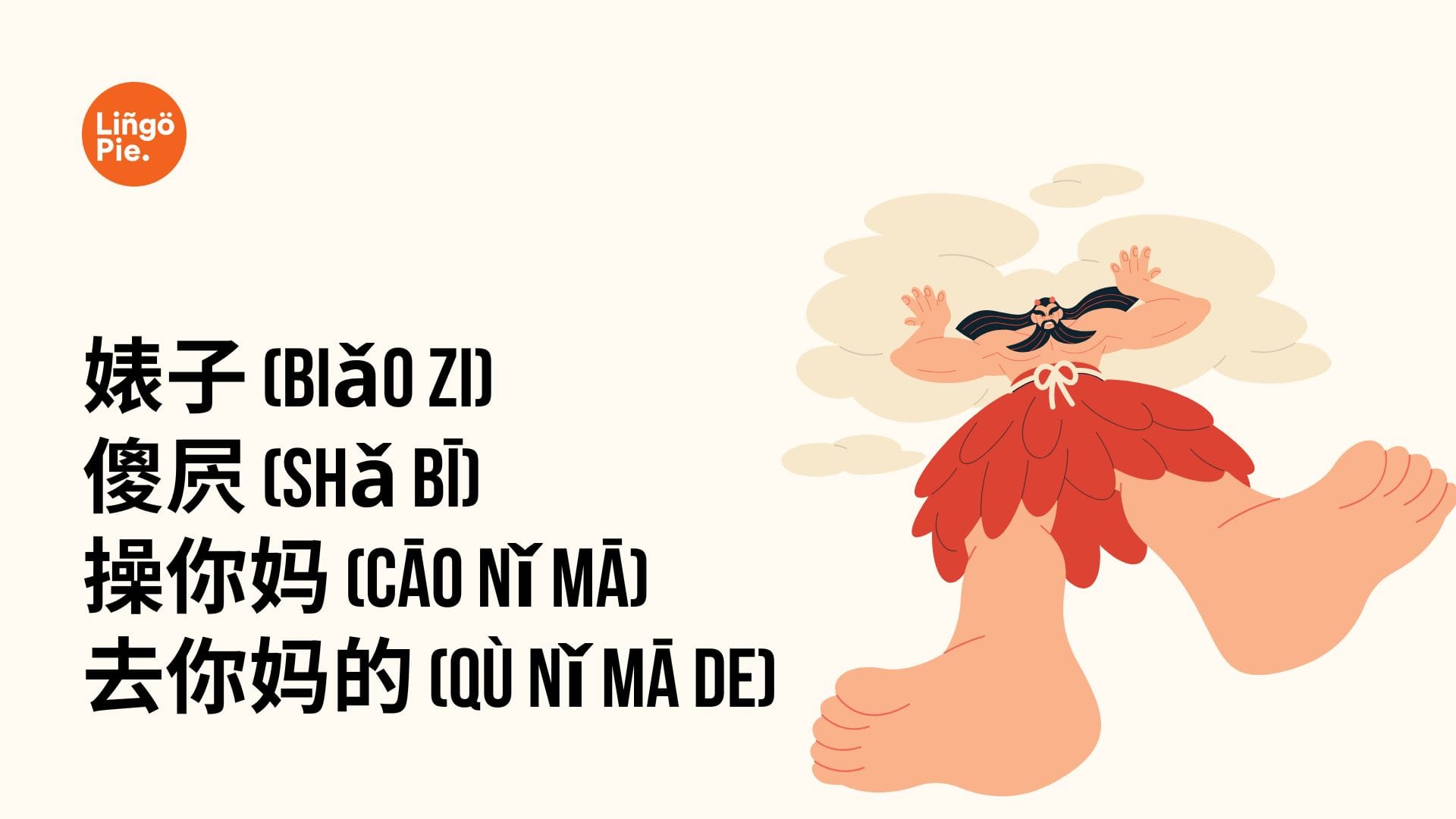
Highly Offensive Chinese Swears
These Chinese curse words attack family honor, ancestors, or use explicit sexual language that can start fights or end relationships. Most involve family members, especially mothers, which cuts particularly deep in Chinese culture.
操你妈 (cāo nǐ mā)
Literally "fuck your mother," this is one of the most classic and insulting swears in Chinese. It attacks someone's mother directly, which is considered the ultimate disrespect in family-oriented Chinese culture. Using this curse essentially declares war on someone's entire family honor and can lead to physical confrontations or permanent relationship damage.
肏你祖宗十八代 (cāo nǐ zǔzōng shíbā dài)
This nuclear-level curse means "fuck your ancestors back to the eighteenth generation" and represents the absolute worst thing you can say in Chinese. It curses not just the person but their entire ancestral line, attacking thousands of years of family history. This is considered unforgivable and using it guarantees you've made a permanent enemy.
傻屄 (shǎ bī)
Meaning "stupid cunt," this combines intellectual insult with explicit sexual vulgarity. You'll commonly hear thousands of angry Chinese fans shouting this at football matches when calls go against their team. It's particularly offensive because it uses crude anatomical terms while questioning intelligence, making it doubly insulting.
婊子 (biǎo zi)
This translates to "bitch" or "whore" and is extremely offensive when directed at women. It attacks a woman's sexual morality and reputation, which carries severe social consequences in Chinese culture. Getting caught using this word toward the wrong person, especially in public, can result in serious social backlash or physical retaliation.
你他妈的去死吧 (nǐ tā mā de qù sǐ ba)
Meaning "you fucking go to hell" or "you fucking die," this combines family insults with death wishes. It's the Chinese equivalent of telling someone to drop dead while insulting their mother simultaneously. According to native speakers, this phrase is considered an effective way to end relationships permanently, though obviously not recommended.
去你妈的 (qù nǐ mā de)
Literally "go to your mother," this is a direct insult targeting someone's family while telling them to fuck off. Unlike the previous family curses, this one is more dismissive than threatening, but still attacks family honor. It's the angry, vulgar way to tell someone to get lost while ensuring they know you have no respect for their lineage.
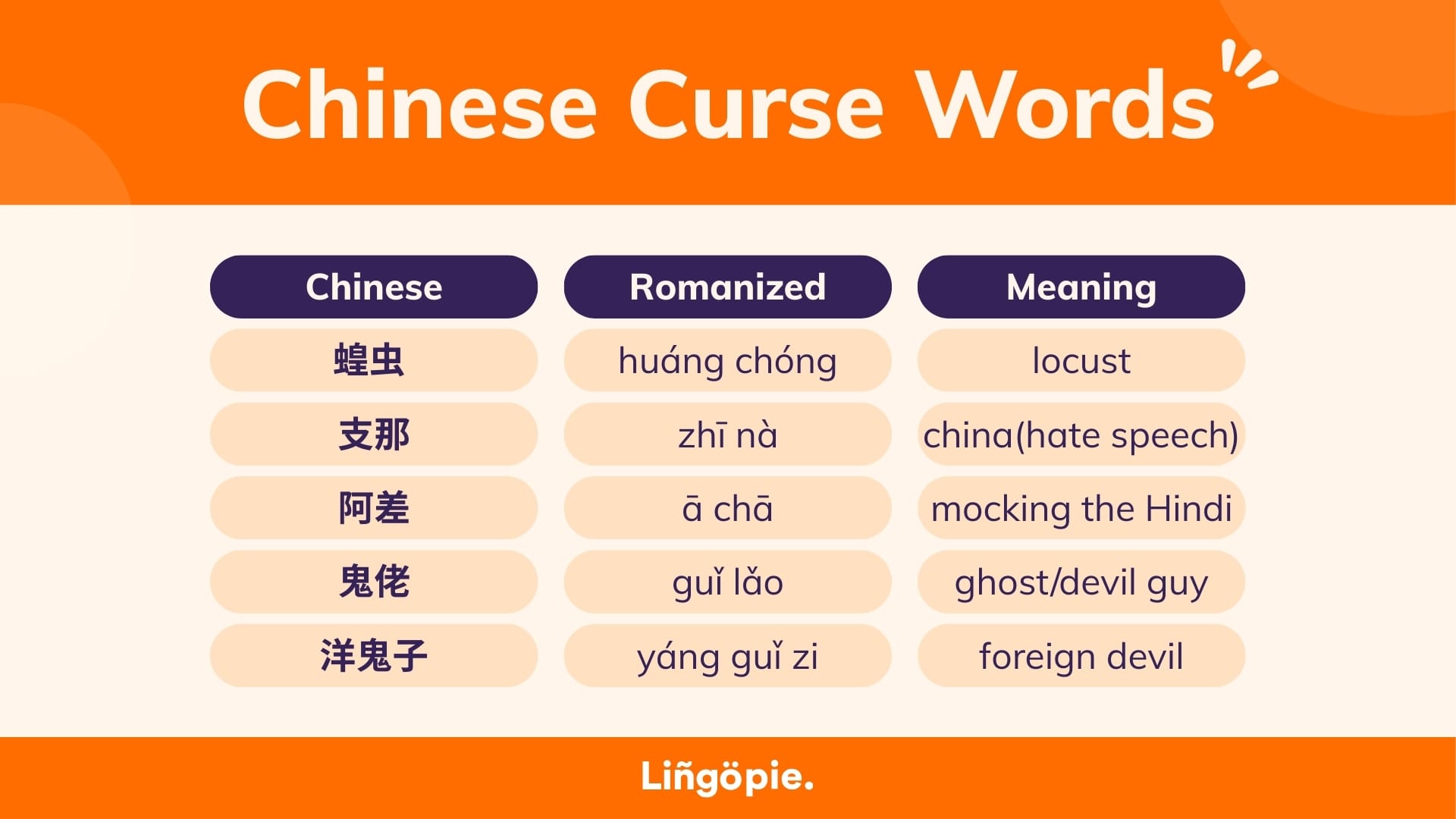
Common Slurs In Chinese
Regional and ethnic slurs that target specific groups of people. These Chinese curse words are socially unacceptable and considered hate speech in many contexts.
蝗虫 (huáng chóng)
Literally meaning "locust," this slur is used by Hong Kongers, Taiwanese, and Singaporeans against mainland Chinese immigrants and tourists. The term suggests mainlanders consume local resources like a swarm of locusts, reflecting economic and cultural tensions. It became prominent during 2012 Hong Kong protests and remains a common way to dehumanize mainland Chinese people.
支那 (zhī nà)
This is equivalent to the N-word for Chinese people and is considered one of the most offensive racial slurs possible. Originally a neutral term, it became associated with Japanese occupation and violence during WWII. Using this word is comparable to using the most extreme racial slurs in English and will immediately identify you as holding deeply racist views.
阿差 (ā chā)
A Cantonese slur commonly used in Hong Kong against Indians and Pakistanis. The term derives from mocking the Hindi word "accha" (good/fine) that Indians frequently use. It's considered highly offensive and reflects discriminatory attitudes toward South Asian minorities in Chinese-speaking regions.
鬼佬 (guǐ lǎo)
Meaning "ghost guy" or "devil guy," this Cantonese term is used as a slur against white Westerners, particularly in Hong Kong. While some may use it casually, it carries negative connotations and reflects historical tensions between Chinese people and Western colonizers. The "ghost" reference suggests something unnatural or frightening about white skin.
洋鬼子 (yáng guǐ zi)
Translating to "foreign devil," this mainland Chinese slur targets white foreigners and reflects historical resentment toward Western imperialism. The term combines "foreign" with "devil," suggesting outsiders are inherently evil or demonic. While less common today, it still surfaces during periods of international tension.
北佬 (běi lǎo)
Used in Guangdong province against people from northern China who don't speak Cantonese. Literally meaning "northern guy," this reflects regional discrimination within China itself. Northern migrants face stereotypes about hygiene, language skills, and cultural differences, making this term a way to mark them as perpetual outsiders despite being Chinese citizens.
Using Chinese Swear Words Appropriately
It is important to recognize that Chinese swear words cover a wide range of categories and their usage requires an understanding of cultural context. Although one word can convey intense emotions, it must also be acknowledged that these terms can be offensive if used incorrectly.
Understanding Context
Understanding the context is crucial when using Chinese curse words. The impact and strength of these terms can significantly vary depending on various factors, such as the specific situation and relationship between those speaking. It’s vital to evaluate the circumstances carefully and not solely rely on the explicit definition before incorporating these words into conversation in order to ensure they are suitable and do not lead to unnecessary misunderstandings or conflicts.
Being Respectful of Cultural Differences
The use of Chinese curse words is tied to the country’s heritage and customs, so it is important to be mindful when using them. Disregarding this can be viewed as a lack of respect for those from China. If one does decide to employ these terms, it should be done sparingly and with proper consideration for the culture and its people.
Learn Chinese Curse Words With Lingopie
Chinese swear words give you a raw, unfiltered look into how people actually talk when they're angry, frustrated, or just being casual with friends. You can't truly understand a language until you know how natives express strong emotions, and textbooks sure aren't going to teach you that.
Now, if this sparked your interest, why not continue learning with Lingopie? Lingopie naturally lets you learn this stuff by watching real Chinese TV shows and movies where people swear. You’ll hear these words in context instead of just memorizing lists, plus you can click on any curse word in the subtitles to get instant translations and save them for later review.
Curious? Try Lingopie by clicking on the button below to unlock a free 7-day trial!
Frequently Asked Questions
What is 250 in Chinese insult?
The number 250 is considered an offensive term in Chinese, often used to insult someone by calling them a “moron” or “stupid.” Its pronunciation is similar to the phrase for two hundred and fifty - “er4 bai3 wu3,” which serves as a way of labeling foolish individuals.
What is the Cao Ni Ma curse?
One of the most offensive swear words in Chinese Mandarin is “Cao Ni Ma,” a vulgar curse that combines expletives for intercourse, the possessive pronoun “your,” and the maternal figure. This phrase is widely considered highly insulting and disrespectful within the language.
How frequently are swear words used in daily Chinese conversations?
The use of swear words is prevalent in everyday Chinese conversations, particularly those pertaining to sexuality. They are viewed as impolite and debatable within the context of Chinese culture.


